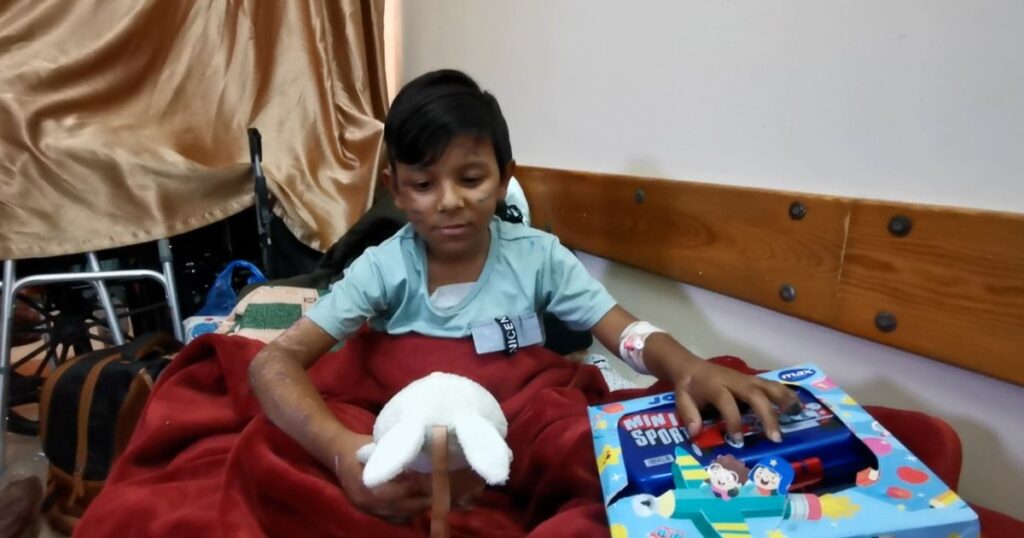What psychological effects could appear on individuals who were exposed to the Israeli aggression in Gaza? What is the effect of war on depression levels? How to deal with and treat these psychological problems?
The head of the Jordanian Psychiatric Association and the leading specialist in psychiatry and addiction treatment, Dr. Alaa Al-Faroukh, says that the psychological disorders and consequences that occur as a result of what individuals go through during the Israeli aggression – with the martyrdom, injuries, and death that it leads to – include two types in general:
- Acute anxiety disorder (acute stress reaction), which people call psychological shock, occurs as a result of direct exposure, and there is intense tension associated with the event, such as hearing the sound of explosions with the death of a relative, and an intense psychological reaction occurs in it, and this usually occurs during the first month after exposure to the severe circumstance.
- Post-traumatic stress syndrome occurs one month after the accident. It is one of the psychological effects that may remain for months and sometimes years. It is one of the most common psychological problems for people who have been exposed to crises and exceptional circumstances that threaten their lives or the lives of people close to them, such as exposure to a bombing or being trapped under rubble.
Psychological resilience
Dr. Alaa Al-Faroukh says that not everyone who is exposed to a difficult circumstance will suffer from post-traumatic stress disorder, and one of the factors on which it depends is what the person possesses of what we call psychological toughness or mental resilience.
Al-Faroukh confirmed that from what he sees and from the data he has from what we see in the news and from colleagues who worked with the people of Gaza in the past and in field hospitals, and witnessed the Gazan people who survived the war, the rate of psychological resilience or toughness among the people of Gaza is very high, unprecedented and exceptional in the world. To the point that some of the wounded or survivors whose family members were martyred or whose homes were demolished did not exhibit post-traumatic stress disorder at all, and it was found that they had a very high psychological resilience.
Al-Faroukh said that one of the internationally accredited schools of psychotherapy is called sublimation therapy or therapy with meaning, and what is meant by this school is that people sometimes transcend their immediate physical or psychological problems by transcending them toward a very high goal and a great value that the person believes in, so he does not feel regret, pain, or remorse. Regardless of the financial circumstances that happen to him in life, because he has a much higher goal that makes the sacrifices he made something that he accepts.
This matter is very clear among the people of Palestine and the people of Gaza, as they are the owners of a cause that they believe in its absolute justice, and they have a high degree of belief in their cause and that it deserves all these sacrifices, Al-Faroukh adds.
How can conflict and war affect children psychologically and emotionally?
Dr. Al-Faroukh said: Intellectual and emotional maturity Children are still immature, so they are more vulnerable than others to post-aggression disorders, indicating that they do not have the psychological immunity that adults have.
He added that children are more vulnerable to post-traumatic stress disorder and severe stress, so they are the group most in need of psychological support.
Stopping the war is the cure
Psychological treatment for the residents of Gaza is first to stop the war of genocide and crimes against humanity committed by the Israeli occupation, because people suffer from post-traumatic stress disorders and stress.
People should feel safe and be provided with basic life services such as food, drink and shelter, followed by psychological support services, cognitive-behavioral therapy and medication as the case may be.

The effect of war on depression levels
Dr. Ahmed Bani Mufarrej, a psychotherapist, said that all studies indicate the effects of wars on high levels of anxiety, stress, and depression among individuals, in addition to sleep problems such as insomnia or nightmares and the desire for isolation and withdrawal, in addition to high levels of depression as a result of the loss of relatives or loved ones.
Dr. Bani Mufarrej – who holds a doctorate in psychology – added that the matter does not end here, but there are post-war repercussions, as the majority of children lose their school seats during the war, not to mention the suffering resulting from the scarcity of resources, in addition to malnutrition.
Obsession with death
Bani Mufarrej confirmed that the level of death obsession rises as a person thinks about death daily and about the fact that he will not survive this war, as is happening now in Gaza, as all places are targeted, even hospitals and schools, in the most heinous war crimes that can be committed.
Dr. Bani Mufarrej said that the incidence of nocturnal or involuntary urination in children increases due to fear as a result of trauma and scenes of destruction and murder.
He added, “Here comes the role of psychological treatment to alleviate the negative consequences of war, especially among children, through group games, dancing, and playing with dolls and songs, which distract their attention and thinking from the traumatic events.”
He added that psychotherapy plays a prominent role in training adult individuals on acceptance and ways to cope with stress, and teaches them ways of positive thinking that contribute to improving their psychological state.

